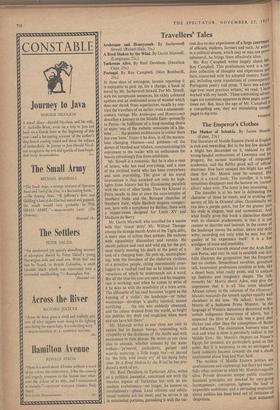Travellers' Tales
Arabesque and Honeycomb. By Sacheverell Sitwell. (Robert Hale, 35s.) A Reed Shaken by the Wind. By Gavin_Maxwell. (Longmans, 21s.)
IN these days of astringent, laconic reporting it is enjoyable to pick up, for a change, a book of travel by Mr. Sacheverell Sitwell. For Mr. Sitwell, with his sumptuous sentences, his richly coloured epithets and an undimmed sense of wonder which does not shrink from superlatives, recalls by con- trast the travellers of an earlier, even a nineteenth- century vintage. His Arabesque and Honeycomb describes a journey to the Middle East—primarily to Persia—in fulfilment of a long-standing desire to enjoy 'one of the esthetic sensations of a life- time . . . the greatest architecture in colour there has ever been.' Enjoy it he does, in all the miracu- lous changing blueness—and goldness—of the domes of Meshed and Isfahan, communicating his enjoyment to the redder with an enthusiasm for beauty refreshingly free from inhibition.
Mr. Sitwell is a romantic. But he is also a man of letters, who has read everything, and a man of the civilised world who has been everywhere and seen everything. The glow of his travel impressions is thus enriched not only by high- lights from history but by illuminating parallels with the arts of other lands. Thus the Khazne at Petra recalls to him at once the cave-temples of Southern India and the Baroque churches of Southern Italy, while Baalbek inspires compari- son, here with a symphony by Berlioz, there with a supper-room designed for Louis XV and Madame du Barry.
Mr. Gavin Maxwell, who travelled for a season with that 'minor deity' Mr. Wilfred Thesiger among the strange marsh Arabs of the Tigris delta, is more man of action than esthete. He endures with equanimity discomfort and vermin. He shoots pelican and coot and wild pig for the pot, once nearly meeting his death at the point of a tusk of a charging boar. He puts up, uncomplain. ing,- with the boredom of the elaborate civilities of a primitive people, sitting interminably cross- legged in a vaulted reed but as he listens to con- versations of which he understands not a word. But all the time his eyes are open and his imagina- tion is working; and when he comes to write of it he does so with the sensibility of a born artist. The silhouette of his reed becomes 'urgent as the keening of a violin'; the landscape—or rather waterscape—develops 'a quality inimical, almost terrifying . . . the sun was suddenly obscured, and the colour drained from the world, as bright sea pebbles dry drab and magicless when wave and sun have left them.'
Mr. Maxwell writes as one close not only to nature but to human beings, responding with sympathy to the drolleries of the Arabs and with excitement to their dances. He writes as one close also to animals, whether amused by the water buffalo—`primeval, pachyderm, patient and wearily enduring; a little tragic too'—or moved by 'the little wild lonely cry' of his dying baby otter. In A Reed Shaken by the Wind he has pro- duced a work of art.
Mr. Basil Davidson, in Turkestan Alive, writes as a political journalist, concerned not with the timeless aspects of Turkestan but with its im- mediate evolutionary—no longer, he assures us, revolutionary—phase. Land reforms and educa- tional systems are his meat, and he serves it up in substantial portions, garnishing it with the cur-
rent day-to-day experiences of a large assortment of officials, students, farmers and such. As actors in a political drama, which may or may not prove ephemeral, he brings them effectively alive.
Mr. Roy Campbell writes largely about Mr. Roy Campbell. This posthumous work is a ran- dom collection of thoughts and experiences and facts concerned with his adopted country Portu- gal, including some translations of contemporarY Portuguese poetry and prose. 'I have one advan- tage over most previous writers,' we read, 'I have worked with my hands.' These contrasting advan• tages are sometimes apparent in these pages, some' times not. But, since the ego of Mr. Campbell is a compelling one, they are stimulating enough
pages to dip into. ximtosS










































































 Previous page
Previous page